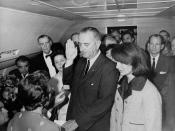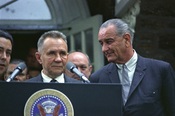After WWII, French colonialism was in motion once more in Vietnam, a country that had been previously colonized by France, followed by Japan after the former fell in 1940. The country's road to nationalism, socialism and eventually communism, was paved over decades of defiance and insurgency, in face of foreign imperialism and domestic corruption within the government. The reasons why the US intervened between 1954 and 1964 can only be understood within the larger context of the Cold War with the Soviet Union and is chiefly a byproduct of imperialism and containment policy, alongside the domino theory.
The US, a democracy with full-blown ideals of self-determinism, and seeing itself as an advocate for freedom, was said to face a dilemma between support for nationalism and its disdain for communism. This was demonstrated by the fact that the US was the main provider of firearms and weapons during the Vietminh's uprising against fascist Japan after 1941 (the formation of the Viet Minh, or the League for Vietnamese Independence).
Throughout the course of the Japanese rule from 1940 to 1945, the Vietminh successfully expanded its base in Tokin and Annam, helping peasants in the proximity through famine and gaining extreme popularity as a result. However, the US' military support can be seen as an ephemeral commitment, as leader Ho Chi Minh initiated the request and Americans were themselves more against the Japanese than for Vietnamese independence. Again, even earlier on in 1919, the US never gave a shred of support for the struggling advocate Ho, who submitted eight demands to the French at the Versailles Peace Conference, following the end of the WWI. Where were anti-imperialism, freedom, and democracy in play then? And was it of any concern for the US during the Geneva Convention when they opposed the promised elections in...


